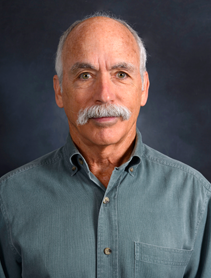
Dr. Jim Spain
- Position: Research Professor
- Department: CEDB/Biology
- Office Location: Building 83, Room 118
- jspain@uwf.edu
- Campus: 850.474.2806
- Personal: 7708510007
- Curriculum Vitae (CV)
Biography
Jim Spain received his PhD in microbiology from The University of Texas at Austin. He worked on fate and transport of marine pollutants including pesticides and petroleum for five years at the U.S. Environmental Protection Agency Marine Environmental Research Laboratory in Gulf Breeze, Florida before joining the Air Force Research Laboratory in 1985. As head of Biotechnology Research he directed a program to discover and develop strategies for biodegradation of industrial and military chemicals including fuels, solvents and explosives. Research at the Air Force also included the exploration of biocatalysts for transformation and synthesis of materials. From 2005 to 2016 he was a Professor of Civil and Environmental Engineering at the Georgia Institute of Technology where he studied biodegradation of soil and groundwater pollutants. He is currently Emeritus Professor at the Georgia Institute of Technology and Research Professor at the University of West Florida. He is a former editor of Applied and Environmental Microbiology and has published extensively on biodegradation and biotransformation of synthetic organic compounds in the environment.
Degrees & Institutions
- Ph.D. Microbiology/Biochemistry, University of TX, Austin, 1979
- B.S. Biology and Chemistry, University of TX, Arlington, 1973
Research
Professor Spain studies environmental biotechnology related to marine, freshwater and subsurface ecosystems to enable elimination of environmental pollution. The emphasis is on discovery and characterization of bacteria that degrade environmentally relevant chemicals. He uses a broad range of techniques from microbiology, biochemistry, molecular biology, microbial ecology, and bioinformatics to reveal the biodegradation mechanisms of organic compounds along with the ecology and evolution of the bacteria that catalyze the processes. Recent work has resulted in the discovery of novel enzymes that expand the understanding of metabolic diversity and capabilities of microorganisms that degrade nitroaromatic chemicals. Basic research in the laboratory leads to the discovery of new biodegradation mechanisms and the bacteria that catalyze the destruction of pollutants. Practical applications involve field work to support bioremediation of contaminated sites and screening for new bacteria. Current projects are funded by DuPont (Corteva), Chemours and the Strategic Environmental Research and Development Program.
Publications
Melo, N., S.P. Araujo, S.P. Kraus, L. Lonheim, P.B. Quintero, E.E. Mack, E.A. Edwards, J.C. Spain, and S. Gavazza. 2023. Strategies for bioremediation of soil from an industrial site exposed to chlorinated and nitroaromatic compounds. Groundwater Monitoring and Remediation. https://doi.org/10.1111/gwmr.12596
Zhang, S.-T., T. Li, S.-K. Deng., J. C. Spain, N.-Y. Zhou. A cytochrome P450 system initiates 4-nitroanisole degradation in Rhodococcus sp. strain JS3073. J. Haz. Mat. 458:131886.
Kurt, Z., Y. Qu and J.C. Spain. 2023. Novel catabolic pathway for 4-nitroaniline in a Rhodococcus sp. Strain JS360. J. Haz. Mat. 454:131473. doi.org/10.1016/j.jhazmat.2023.131473.
Li, T., A.L. Brower, Z.J. Xu, Y. Xu, J.C. Spain and N.Y. Zhou. 2023. Molecular basis and evolutionary origin of 1-nitronaphthalene catabolism in Sphingobium sp. Strain JS3065. Appl. Environ. Microbiol. e01728-22.
Menezes, O., C. Owens, E.E. Rios-Valencia, R. Sierra-Alvarez, J.A. Field, and J.C. Spain. 2022. Designing bacterial consortia for the complete biodegradation of insensitive munitions compounds in waste streams. Biotechnol. Bioeng. 119:2437-2446.
Menezes, O., K. Kocaman, S. Wong, E.E. Rios-Valenciana, E.J. Baker, J.K. Hatt, J. Zhao, C.L. Madeira, M.J. Krzmarzick, J.C. Spain, R. Sierra-Alvarez, K.T. Konstantinidis and J.A. Field. 2022. Quinone moieties link microbial respiration of natural organic matter to chemical reduction of diverse nitroaromatic compounds. Environ. Sci. Technol. DOI: 10.1021/acs.est.2c01329. 56:9387-9397
Xu, Zhi-Jing, J.C. Spain, N.Y. Zhou, and T. Li. 2022. Biodegradation of 3-chloronitrobenzene and 3-bromonitrobenzene by Diaphorobacter sp. strain JS3051. Appl. Environ. Microbiol. 88. e02437-21.
Karthikeyan, S., J.K. Hatt, M. Kim, J.C. Spain, M. Huettel, J.E. Kostka and K.T. Konstantinidis. 2021. A novel, divergent alkane monooxygenase (alkB) clade involved in crude oil biodegradation. Environ. Microbiol. Rep. doi:10.1111/1758-2229. 13:830-840.
Li, Tao, Y.Z. Gao, J. Xu, S.T. Zhang, Y. Guo, J.C. Spain, N.Y. Zhou. 2021. A recently assembled degradation pathway for 2,3-dichloronitrobenzene in Diaphorobacter sp. strain JS3051. mBio. doi: 10.1128/mBio.02231-21.
Hanson, A., K.K. Askarani, S. Gallo, B. Carling, C. Mowder, JC Spain, A. Harten, T. Sale, J. Blotevogel. 2021. Real-time remediation performance monitoring with ORP sensors. Groundwat. Mon. and Remed. 41:27-28. doi: 10.1111/gwmr.12479
Liu, J., Ying Xu, Shi-Kai Deng, Lei Liu, Jun Min, Ting Shi, Jim Spain, and Ning-Yi Zhou. 2021. Physiological role of the previously unexplained benzenetriol dioxygenase homolog in the Burkholderia sp. strain SJ98 4-nitrophenol catabolic pathway. Appl. Environ. Microbiol. DOI: 10.1128/aem.00007-21.
Madiera, C., O. Menezes, D. Park, K. Jog, J. Hatt, S. Gavazza, M. Krzmarzick, R. Sierra-Alvarez, J. Spain, K. Konstantinidos, J. Field. 2021. Bacteria make a living breathing the nitro-heterocyclic insensitive munitions compound 3-nitro-1,2,4-triazol-5-one (NTO). Environ. Sci. Technol. https://doi.org/10.1021/acs.est.0c07161
Gao, Yi-Zhou, M.L. Palatucci, L.A. Waidner, T. Li, Y. Guo, J.C. Spain and N.Y. Zhou. 2020. A Nag-like dioxygenase initiates 3,4-dichloronitrobenzene degradation via 4,5-dichlorocatechol in Diaphorobacter sp. Strain JS3050. Environ. Microbiol. https://doi.org/10.1111/1462-2920.15295.
Karthikeyan, S., M. Kim, P. Heritier-Robbins, J. Hatt, J.C. Spain, W. Overholt, M. Huettel, J. Kostka, and K. Kostantinidis. 2020. Integrated omics elucidate the mechanisms driving the rapid biodegradation of Deepwater Horizon oil in intertidal sediments undergoing oxic-anoxic cycles. Environ. Sci. Technol. 54:10088–10099.
Sexton, W.K., M. Fidero, J.C. Spain, L. Jiang, K. Bucalo, J.M. Cruse-Sanders and G.S. Pullman. 2020. Characterization of endophytic bacterial communities within greenhouse and field- grown rhizomes of three rare pitcher plant species (Sarracenia oreophila, S. leucophylla, and S. purpurea spp. venosa) with an emphasis on nitrogen-fixing bacteria. Plant and Soil. 447: 257–279.
Of 170- see Google Scholar
Keywords: environmental biotechnology, marine, freshwater, subsurface ecosystems, environmental pollution, characterization of bacteria, microbiology, biochemistry, molecular biology, microbial ecology, and bioinformatics, biodegradation mechanisms, organic compounds, ecology and evolution of the bacteria, novel enzymes, metabolic diversity, capabilities of microorganisms, nitroaromatic chemicals


